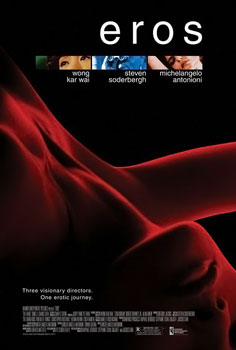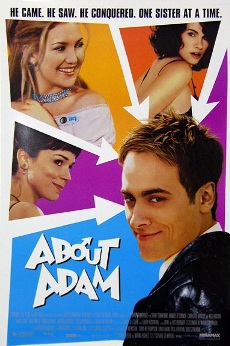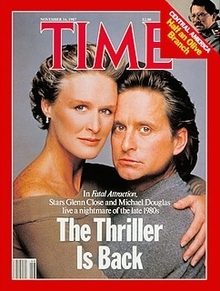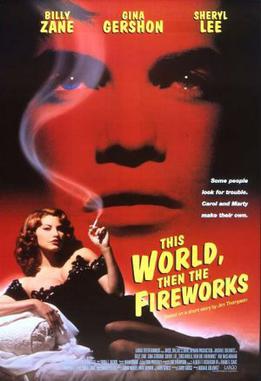
Eyes Wide Shut is a 1999 erotic mystery psychological drama film directed, produced, and co-written by Stanley Kubrick. It is based on the 1926 novella Dream Story by Arthur Schnitzler, transferring the story's setting from early twentieth-century Vienna to 1990s New York City. The plot centers on a physician who is shocked when his wife reveals that she had contemplated having an affair 12 months earlier. He then embarks on a night-long adventure, during which he infiltrates a masked orgy of an unnamed secret society.

Terence Henry Stamp is an English actor. Known for his sophisticated villain roles, he was named by Empire as one of the 100 Sexiest Film Stars of All Time in 1995. He has received various accolades including a Golden Globe Award, a Cannes Film Festival Award, and a Silver Bear as well as nominations for an Academy Award and two BAFTA Awards.

The Brown Bunny is a 2003 film written, directed, produced, photographed and edited by Vincent Gallo. Starring Gallo and Chloë Sevigny, it tells the story of a motorcycle racer on a cross-country drive who is haunted by memories of his former lover. It was photographed with handheld 16 mm cameras in various locations throughout the United States, including New Hampshire, Massachusetts, Ohio, Missouri, Utah, Nevada, and California.

Jennifer Jason Leigh is an American actress. She began her career on television during the 1970s before making her film breakthrough in the teen film Fast Times at Ridgemont High (1982). She received critical praise for her performances in Last Exit to Brooklyn (1989), Miami Blues (1990), Backdraft (1991), Single White Female (1992), and The Hudsucker Proxy (1994), and was nominated for a Golden Globe for her portrayal of Dorothy Parker in Mrs. Parker and the Vicious Circle (1994).
Bliss is a common noun meaning 'extreme happiness'. It may also refer to:

The Limey is a 1999 American crime film directed by Steven Soderbergh and written by Lem Dobbs. The film features Terence Stamp, Lesley Ann Warren, Luis Guzmán, Barry Newman, Nicky Katt, and Peter Fonda. The plot concerns an English career criminal (Stamp) who travels to the United States to investigate the recent suspicious death of his daughter. It was filmed on location in Los Angeles and Big Sur.

Dracula is a 1958 British gothic horror film directed by Terence Fisher and written by Jimmy Sangster based on Bram Stoker's 1897 novel of the same name. The first in the series of Hammer Horror films starring Christopher Lee as Count Dracula, the film also features Peter Cushing as Doctor Van Helsing, along with Michael Gough, Melissa Stribling, Carol Marsh, and John Van Eyssen. In the United States, the film was retitled Horror of Dracula to avoid confusion with the U.S. original by Universal Pictures, 1931's Dracula.

Flatliners is a 1990 American science fiction psychological horror film directed by Joel Schumacher, produced by Michael Douglas and Rick Bieber, and written by Peter Filardi. It stars Kiefer Sutherland, Julia Roberts, William Baldwin, Oliver Platt, and Kevin Bacon. The film is about five medical students who attempt to find out what lies beyond death by conducting clandestine experiments that produce near-death experiences. The film was shot on the campus of Loyola University Chicago between October 1989 and January 1990, and was nominated for an Academy Award for Best Sound Editing in 1990. The film was theatrically released on August 10, 1990, by Columbia Pictures. It grossed $61 million at the box office.

Sheryl Lee is a German-American film, stage, and television actress. After studying acting in college, Lee relocated to Seattle, Washington to work in theater, where she was cast by David Lynch as Laura Palmer and Maddy Ferguson on the 1990 television series Twin Peaks and in the 1992 film Twin Peaks: Fire Walk with Me. After completing Twin Peaks, she returned to theater, appearing in the title role of Salome on Broadway opposite Al Pacino.
Craig Eric Sheffer is an American film and television actor. He is for his starring roles as Hardy Jenns in Some Kind of Wonderful (1987), Aaron "Cabal" Boone in Nightbreed (1990), Norman Maclean in A River Runs Through It (1992), Joe Kane in The Program (1993), Joseph in Bliss (1997), and as Keith Scott on the television series One Tree Hill (2003–12).
In film, nudity may be either graphic or suggestive, such as when a person appears to be naked but is covered by a sheet. Since the birth of film, depictions of any form of sexuality have been controversial, and in the case of most nude scenes, had to be justified as part of the story.

Eros is a 2004 anthology film consisting of three short segments: The Hand directed by Wong Kar-wai in Mandarin, Equilibrium by Steven Soderbergh in English, and The Dangerous Thread of Things by Michelangelo Antonioni in Italian. Each segment addresses the themes of love and sex.

About Adam is a 2000 romantic comedy film written and directed by Gerard Stembridge and starring Kate Hudson, Stuart Townsend, and Frances O'Connor. The plot focuses on the effect a seductive young man has on four siblings.
Kiss the Sky is a 1998 drama film directed by Roger Young. The plot follows two men in their forties and friends since college who take a business trip to the Philippines. There they examine their lives and consider trading their adult responsibilities for a return to the hedonism of their youth. The film was shot in the locations of Manila, Taal Lake, and Batangas.

Shortbus is a 2006 American erotic comedy-drama film written and directed by John Cameron Mitchell. The plot revolves around a sexually diverse ensemble of colorful characters trying desperately to connect in an early 2000s New York City. The characters converge in a weekly Brooklyn artistic/sexual salon loosely inspired by various underground NYC gatherings that took place in the early 2000s. According to Mitchell, the film attempts to "employ sex in new cinematic ways because it's too interesting to leave to porn." Shortbus includes a variety of explicit scenes containing non-simulated sexual intercourse with visible penetration and male ejaculation.

All or Nothing is a 2002 British drama film written and directed by Mike Leigh and starring Timothy Spall and Lesley Manville. Like much of Leigh's work, the film is set in present-day London, and depicts three working-class families and their everyday lives.

The erotic thriller or sexual thriller is a film subgenre defined as a thriller with a thematic basis in illicit romance or sexual fantasy. Though exact definitions of the erotic thriller can vary, it is generally agreed "bodily danger and pleasure must remain in close proximity and equally important to the plot." Most erotic thrillers contain scenes of softcore sex and nudity, though the frequency and explicitness of those scenes can differ from film to film.

Destricted is a 2006 anthology film that explores the line where art and pornography intersect. The United Kingdom and United States film releases had overlapping but different short art-house erotic films. The film collection won awards at a range of international film festivals.

Sex in film, the presentation of aspects of sexuality in film, especially human sexuality, has been controversial since the development of the medium. Films which display or suggest sexual behavior have been criticized by religious groups or have been banned or censored by governments, although attitudes have changed much along the years and a more permissive social environment has developed in certain parts of the world, notably in Europe, North America, Australia and New Zealand. In countries with a film rating system, films which contain explicit sex scenes typically receive a restricted classification. Nudity in film may be regarded as sexual or as non-sexual.

This World, Then the Fireworks is a 1997 American crime drama film directed by Michael Oblowitz and starring Billy Zane, Gina Gershon, and Sheryl Lee. The screenplay is based on a short story of the same name by Jim Thompson.
















